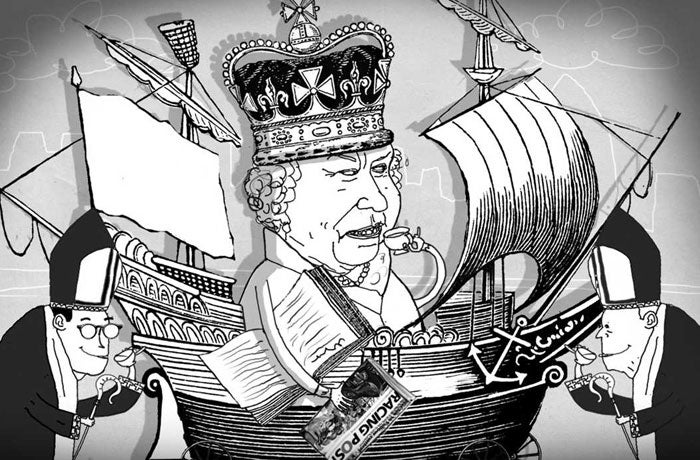Boyd Tonkin: 'Even Her Majesty loves Canada – its tourist board knows where to find the next face of its campaign'
Tales of the city

The Queen hosted a mixed bag of guests last week. As well as laying on tea and sympathy at the Palace for the purple tide (or should that be purple haze?) of Anglican bishops in Canterbury for the Lambeth Conference, she had her annual chat with the overall winner of the Commonwealth Writers' Prize. This is the only point in the royal calendar at which the monarch commits to meeting a writer. By all accounts (since you asked), she really does take time to read the winning book.
Not quite every author has welcomed this perk of victory. The anti-monarchist Mark Haddon declined his royal tête-à-tête as a curious incident too far. But a line of quizzically post-imperial Indians, defiantly republican Aussies and charmingly bemused Canadians seems to have enjoyed this rare literary benediction from the House of Windsor. This year's visitor was the Canadian Lawrence Hill, who won with his ocean-hopping novel of the Atlantic slave trade and its survivors, The Book of Negroes.
At Canada House on Friday, Hill reminded us that his parents had crossed the border from the US half a century ago. His father was black, his mother white: they left the day after they married in the South. At the same time, a few hundred yards away, Barack Obama rolled up to No 10 and went about his business of re-kindling the American Dream that failed the Hills. How will Nice Canada rebrand itself if its gruff neighbour puts on a smiley face again? Even Her Majesty loves the place to bits, we were told. The tourist board knows where to go in search of a fresh face for the next campaign.
The Commonwealth prize has a track record to brag about: among others, Louis de Bernières, Vikram Seth, Zadie Smith and Andrea Levy picked up their first major gong from this source. But then I'm biased: a few years ago, its regional heat gave me a judging experience to cherish. Forget poky rooms in Soho clubs. At the Hotel Suisse in Kandy, up in the central highlands of Sri Lanka, we deliberated on the lawns under the shade of an ancient tree, sipping locally-grown tea, the lake below and the jungly hills above. As for our winners, I and my co-judges – from Sri Lanka and India – chose books about faraway, mysterious places: the Lake District (Sarah Hall's Haweswater) and the Surrey suburbs (Michael Frayn's Spies). The lure of the exotic depends on where you sit.
One of Lawrence Hill's ports of call in London was the Museum in Docklands. On Sunday, it held its fifth birthday party, with Bollywood make-up sessions, free chocolate cake and a crew of costumed actors in the guise of Indian seamen or East End pub landladies. Delight mixes with a kind of embarrassment when you pay heed at last to a long-neglected treasure on your doorstep. Since it opened, I have trundled endlessly past the museum as the superannuated futurism of the Docklands Light Railway skirts the pastiche Renaissance palace of the West India Dock warehouse (where it lives). In temperatures more usually found in the islands that cultivated the produce once stacked within, I finally went inside and took its tour of 2,000 years of London's history as a trading port. As I had suspected, it's an utterly absorbing gem. In addition to the serious stuff (the gear and tackle; the maps and snaps and documents), the period reconstructions are a treat. The murky East End alleyways of "Sailor Town" feel so credible (down to the spicy, but slightly dubious, whiffs) that you wonder where Jack the Ripper might skulk.
Maybe Obama should have dropped in here as well. The museum's still-shocking galleries devoted to "London, sugar and slavery" would have delivered a hundredweight of sound bites and photo-ops. This building was begun in 1800 and finished in 1802. Until 1807, slave-carrying ships would have moored outside; until 1833, slave-grown and slave-loaded hogsheads of sugar and casks of rum were (as a caption points out) "stored where you are now standing". Talk about living history. Several exhibits prove that the simple human sympathy now branded "political correctness" by the bellowing herd of Britain's commentating class has been around for quite a stretch. I loved the abolitionist pamphlets printed in 1828 by the "Peckham Ladies' African and Anti-slavery Association". Today's macho bullies would surely not have dared to mess with them.
As the city swelters, office drones dream of escape. Outside this newspaper's Docklands HQ, visiting vessels – from fancy tall ships and dinky repro schooners to hulking destroyers – tie up for a day or two. Each one has a yarn to spin of distant ports and epic voyages. So who's this grey lady, looming over the staff canteen? The Brasil, fleet number U-27. A couple of minutes among the salty geeks who swarm over the net tells me that this is the chief training ship of the Brazilian navy, built at the Arsenal do Marinha in Rio, commissioned in August 1986: 3,168 tons; 218 crew and 204 cadets; two 40mm Bofors guns. In a trice, it seems, she's gone, headed back to Rio, setting a course downriver into the widening Thames and along – as Conrad's Heart of Darkness has it – "the tranquil dignity of a waterway leading to the uttermost ends of the earth".
John Walsh is on holiday
Join our commenting forum
Join thought-provoking conversations, follow other Independent readers and see their replies
0Comments